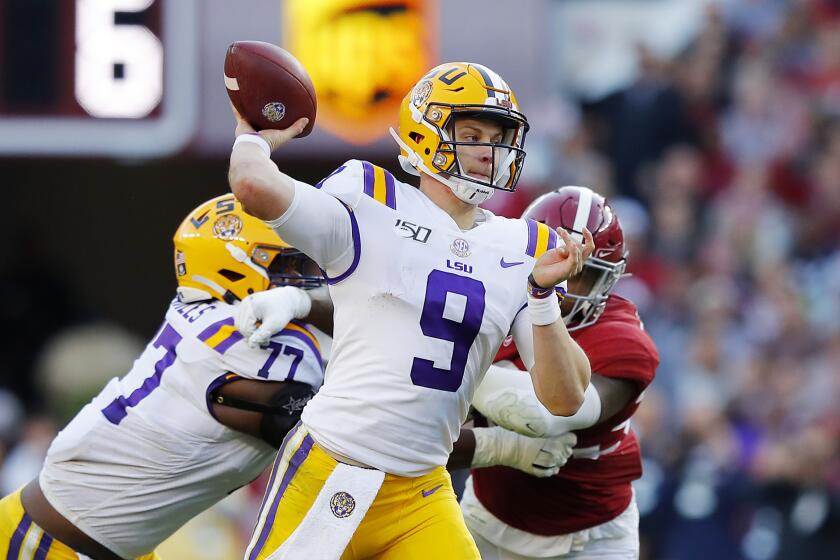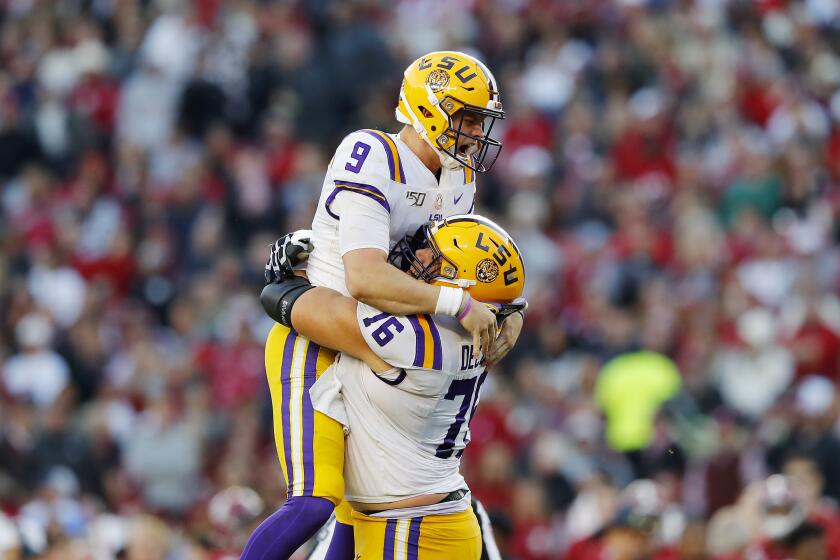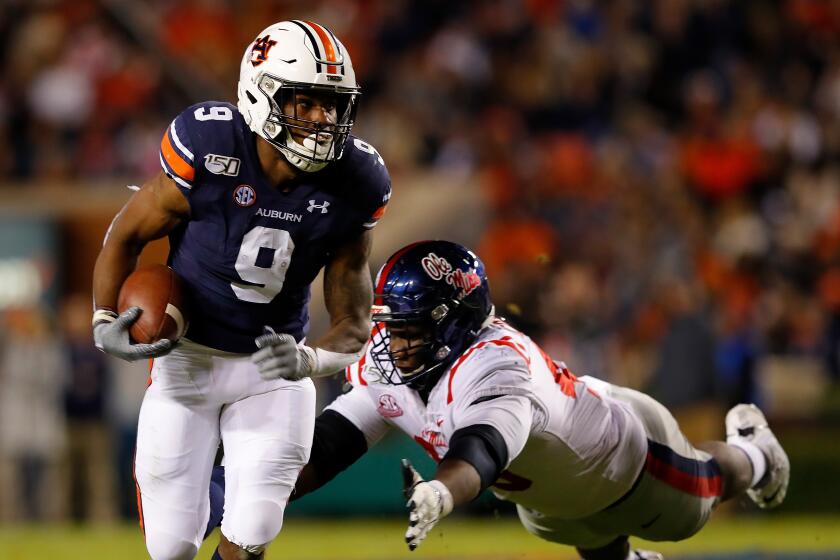Ed Orgeron is right at home in leading LSU to the top
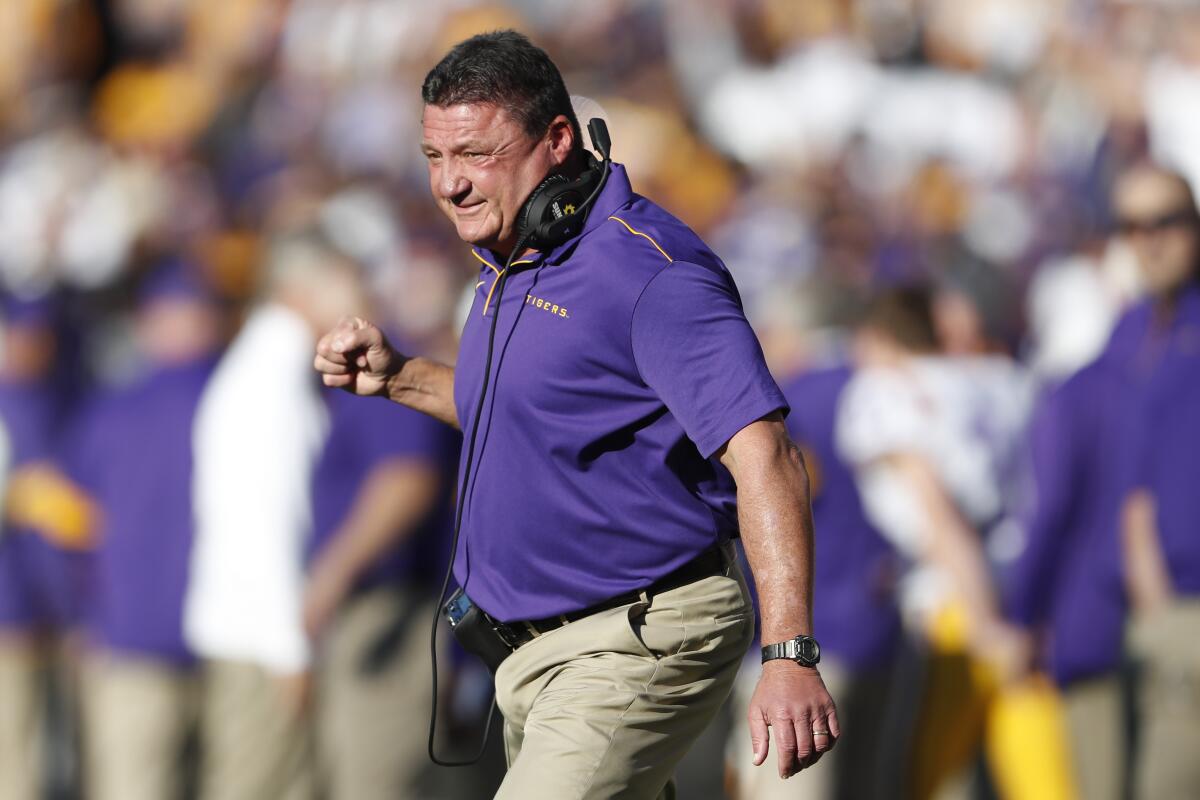
- Share via
BATON ROUGE, La. — Ed Orgeron can’t get enough of the view. He leads a visitor through a “war room” where he and a few staff members are watching film of an offensive line drill from practice, shuffles through his office and opens the double doors onto a balcony fit for a head of state.
Orgeron takes a seat and looks directly east toward Tiger Stadium towering in the distance. The old cement structure known for withstanding the kind of rousing support that results in seismic activity on fall Saturday nights sits in silence, and a full moon hangs high above, illuminating faint white clouds against a dark blue sky.
“You kiddin’ me?” Orgeron says. “How about this place, huh?”
It is home, and yet he has never seen it quite like this. Two days have passed since Louisiana State beat Alabama in college football’s latest “Game of the Century,” a win that felt more like a statewide exorcism. Just like that, gone were the eight long years of Nick Saban’s tyranny, and gone were the fears that one of their own would never rise up and take down the one who got away.
The party started as soon as running back Clyde Edwards-Helaire iced the game with a late seven-yard touchdown run Saturday and raged through the holiday weekend. It is finally dying down now on this peaceful Monday night, as the faithful prepare to return to their lives.
Joe Burrow passed for 393 yards and three touchdowns and No. 2 LSU snapped an eight-game losing streak to No. 3 Alabama with a 46-41 victory on Saturday.
But how could there ever be normalcy again? The 9-0 Tigers are No. 1 in every poll in the land. This should be Orgeron’s moment, but the native son of Lafourche Parish doesn’t claim it as his own.
“I felt it,” Orgeron says in his trademark rumbling growl. “I felt it as a resident, as a fan, and I feel it as a coach. Freedom, man. We don’t have to hear that stuff no more. I’m just happy for the people of Louisiana.”
Orgeron’s lofty perch from the balcony of the newly opened LSU Football Operations Center creates the impression of a king surveying his kingdom, only he wants to share the riches with everyone.
He can’t take these gifts for granted, because deep down he knows it so easily could have been someone else manning the throne. Someone younger, flashier, more sellable, someone who could pass through the same central casting requirements for a big-time college football coach that Orgeron could not meet six years ago right down the road from Hollywood at USC.
If there was ever a top program that would accept the red-faced 58-year-old Cajun with the gravelly accent as a proper cultural fit, it is this one, nestled between mossy University Lake and the banks of the Mighty Mississippi. And yet, even here, he was not wanted in the role after putting together a 6-2 record as the interim head coach, just as he had done at USC before Steve Sarkisian was offered the job.
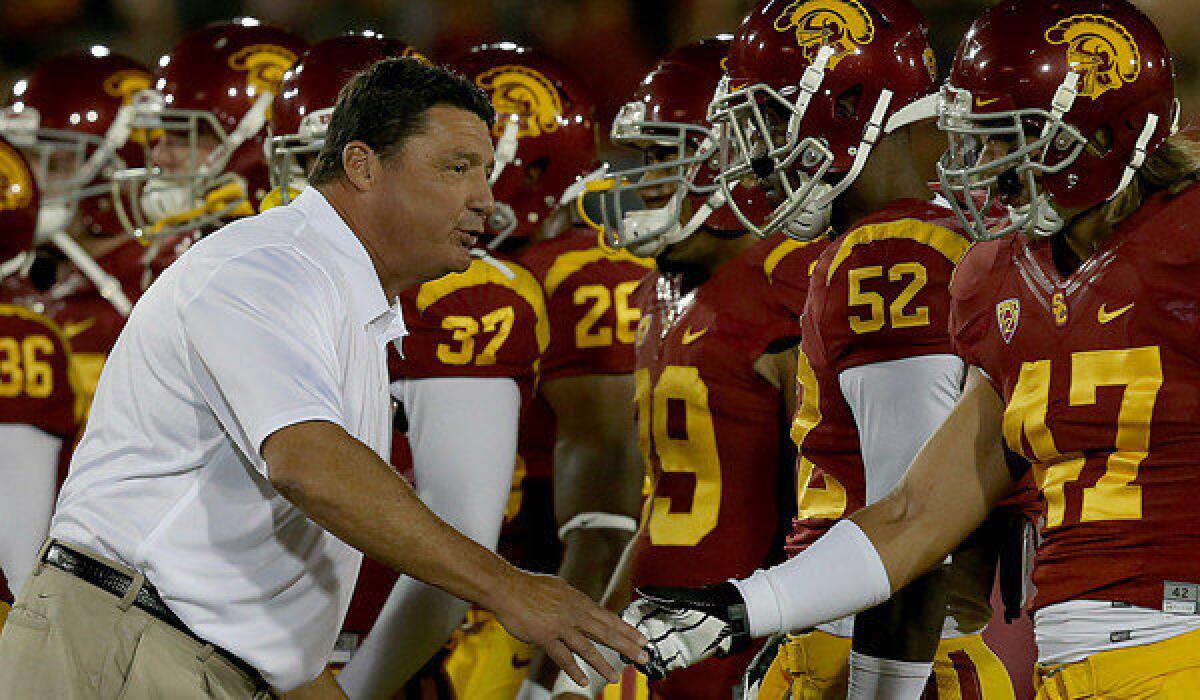
At LSU, the hot name was Tom Herman, then the coach at Houston. Since those uncertain days, Orgeron has won more games against top-10 opponents than any other coach — including one against Herman’s Texas team Sept. 7 in Austin — but reliving the last week of the 2016 season still induces a tinge of terror in Orgeron’s darting brown eyes.
LSU played at Texas A&M on Thanksgiving Day that year. The night before, Orgeron’s wife, Kelly, came back from dinner and told him that she heard LSU had offered the job to Jimbo Fisher, then the coach of Florida State. The Tigers roughed up the Aggies, but later on Thanksgiving night, a staff member told Orgeron that a report was saying LSU had offered the job to Herman.
“I said, ‘That’s good! Last night it was Jimbo, tonight it’s Tom, maybe tomorrow it’s us!’ ” Orgeron recalls.
He laughs at the remembrance, but it was hard to keep perspective then.
“Because I been here before, you know,” Orgeron says, a subdued reference to his USC heartbreak.
The Friday after beating Texas A&M, he met with then-LSU athletic director Joe Alleva, ready to fight for what he believed was right. A couple of Orgeron’s staff members had helped him compile books and manuals overflowing with creative ideas of how to bring the Tigers back to the level they achieved Saturday night in Tuscaloosa.
He felt he had already spurred a cultural transition from team into family, the Tigers’ collective heart swelling and pulling their bodies further than they ever thought they could go.
But Alleva set the vast reading material aside and leveled with Orgeron.
“I gotta tell you, I’m going to meet with Tom Herman tonight,” Alleva said.
“I told my staff to leave,” Orgeron says. “I said, ‘Joe,’ and I touched him in his belly, ‘You know in your belly I’m the right man for LSU. I look forward to being the next head coach of LSU,’ and I walked out.”
The second College Football Playoff rankings were released Tuesday, and as expected, LSU and Ohio State swapped places to take the top two spots.
That night, at home in Mandeville, his family staged a belated Thanksgiving dinner. Orgeron felt so sick he couldn’t eat. He went off to bed and prayed. Before he could fall asleep, news flashed across the ticker that Herman was expected to take the LSU job. Kelly assured him it couldn’t be true, that he would wake up the next morning and be offered the position.
“I said, ‘What you drinkin’?!” Orgeron says, banging a table for effect.
In the middle of the night, Orgeron woke to his phone buzzing. Lane Kiffin, whom he had promised Alleva would be his offensive coordinator, said Herman was now reportedly leaning toward Texas. Around 5:30 a.m., Orgeron missed a call from Alleva. He frantically called back.
“Can you be here at 7:30?” Alleva asked.
In a flash, Orgeron was blazing his truck down Interstate 12. He put on his favorite song, Creedence Clearwater Revival’s “Born on the Bayou,” a low-country boy feeling a high he’d never experienced, before he realized something important: He hadn’t been offered the job yet.
He arrived at the office and saw Alleva waiting for him by the Tiger statue at the entrance.
“You want the job or what?” Alleva said.
“I grabbed him and shoooook him, maaan!” Orgeron says.
“You know, when you pointed to my belly, all night long I was feeling something in my belly,” Alleva told him.
“I said, ‘I put that Cajun gravy on you, boy!’ ” Orgeron says with a hearty cackle.
Orgeron never asked what happened with Herman, whether he was offered the position or not. It didn’t matter one bit then and still doesn’t. Just check out the blessings life has bestowed upon him.
“I got my own elevator!” he says.
::
Last Saturday night in the visitors’ locker room at Bryant-Denny Stadium, the lifetime LSU fan inside Orgeron busted out. His players had just slain the Alabama dragon 46-41, and they surrounded their exuberant head coach, waiting for inspiration.
“Roll Tide, what? ... you!” Orgeron screamed to applause, using an expletive.
What he did not know at the time was that one of his players had set up a live stream on his phone of the team’s raucous celebration, and now the world knew what Orgeron could be like behind closed doors. It was the type of behavior that could have made any remaining critics of his cultural fit at USC feel vindicated.
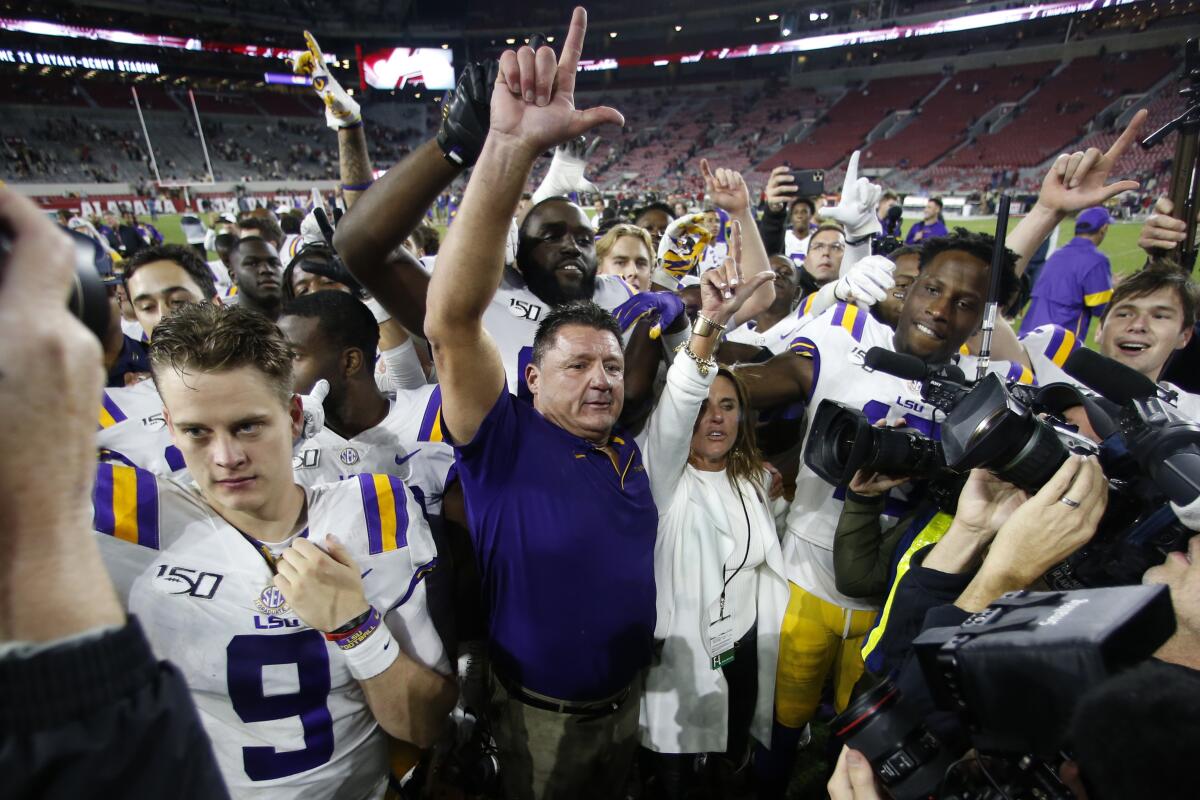
It only made him more beloved here.
“That shouldn’t have happened,” Orgeron said when asked about the locker room moment being live streamed at his Monday news conference. “I addressed the player who did it. He felt bad.”
Orgeron did not apologize.
“You know, the things that I say outside to the media, those are things I want to get out. If I wanted that to get out, I would have said that outside,” he said, drawing laughter from media. “But when you get emotional, you talk to your team like it’s your family. The way I talk to my family around the dinner table, we say some things that outside the family we don’t say. It was not meant to hurt anybody, nothin’ like that. Just a fiery moment, a very emotional moment with our team, that’s all it was.”
The Tigers had set the whole state on fire. When they returned home, thousands had gathered at the airport to shower them with cheers. Offensive coordinator Steve Ensminger, who played quarterback for LSU in the late 1970s and has been on staff the last decade, told Orgeron he hadn’t seen anything like it. Quarterback Joe Burrow, the Heisman Trophy favorite, posted a video on Twitter of him jogging along a fence slapping hands and said, “Louisiana, I love you.”
On Sunday morning at Grace Life Fellowship, lead pastor Tim Chalas opened worship by saying, “The gospel has a lion that defeats Satan. We had Tigers that defeated Saban, so it’s not exactly the same, but it sure feels good to be an LSU fan today, doesn’t it?”
John Bel Edwards, the Democratic governor of Louisiana, is up for reelection with a Saturday runoff against Republican Eddie Rispone. Edwards and Orgeron have become friends after meeting at a duck camp in South Lafourche Parish a few years ago, and it’s safe to say Edwards is relieved Orgeron isn’t on the ballot.
“I’ve been out campaigning right now, all over the state,” Edwards says, “and I will tell you there’s more excitement around that LSU football program than anytime I can remember in my life, and I’m 53 years old.”
But wait. The Tigers won the 2003 and 2007 national championships with Saban and Les Miles, respectively, running the program. How could this be more thrilling than that? Edwards explains it’s the way this LSU team is doing it, with a high-flying spread offense that never stops attacking. Then there’s the matter of the ultimate underdog who gets to sit on that balcony in Baton Rouge.
“The rest of the country has a hard time understanding him, but we don’t,” Edwards said of Orgeron. “We recognize that as a South Louisiana, South Lafourche accent, and to have a homegrown coach, a Louisiana native who is obviously very passionate about our state, to have him coaching while we’re doing so well, it does add an extra bit of excitement.
College football Week 12 picks: Take Auburn to defeat visiting Georgia and Minnesota to win at Iowa.
“We’re just glad y’all didn’t hire him at USC, and he became available and found his way to LSU.”
Now’s the time time to gloat. The Trojans had to move on from Sarkisian within two years because of the coach’s issues with alcohol, and athletic director Pat Haden decided Clay Helton was the interim head coach worth keeping. USC is now in Year 4 of Helton’s turbulent tenure, and the program appears on the brink of turnover yet again.
“It was indicated to me that I’m getting the job,” Orgeron recalls of USC. “Then we lost to UCLA [35-14 in 2013], and all hell broke loose. We just didn’t play well. I couldn’t put my finger on it. The next day I didn’t hear from anybody. Monday I told the team bye, and they’re crying, ‘You’re like the father I never had. Why is this happening?’
“But now we all see why it happened. I’ve got no regrets. This is the place I always wanted to be. I was born to be here, and I cherish every day.”
Former USC coach John Robinson, who joined Orgeron’s LSU staff this fall as an offensive consultant, says he told plenty of Trojans in 2013 that USC should keep Orgeron.
“It was a poor decision, or unfortunate decision, to let him go,” Robinson says. “He’s a leader of people. I grew up with John Madden from the third grade on, and I compare the two in that they’re really intelligent and really understand people, but they don’t give you that impression right off the bat.”
LSU was willing to look deeper with Orgeron, but it was not going to be a popular decision.
“It was tremendous pressure from people to hire Tom Herman or Jimbo Fisher, one of those guys,” Alleva says. “If I were a younger man, in my 40s, I probably would have succumbed to that pressure, because that’s the easy way out. That’s what most ADs do. They hire the pretty face guy.”
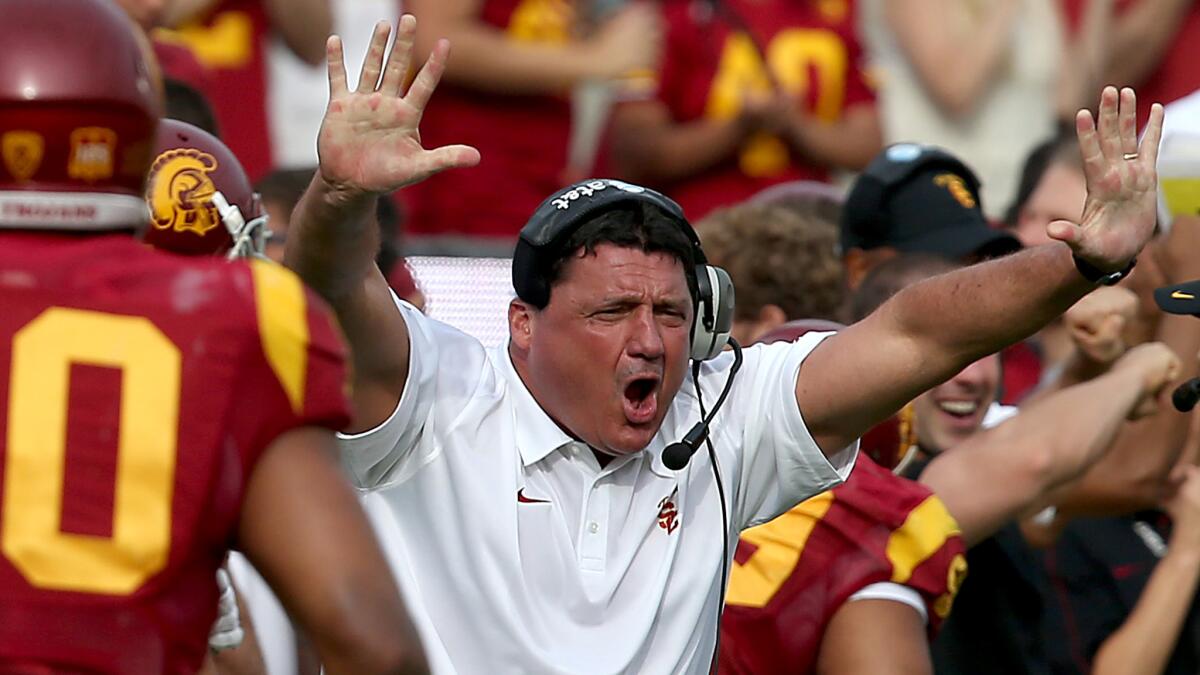
Orgeron says Alleva was clear with him that Herman was the competition. What Alleva couldn’t tell him then was that he was pushing for Orgeron, but he had to also consider the wishes of the small group of representatives from the LSU board who wanted to chase Herman.
“I remember it boiling down to, do you want the one who you know loves you or the one you think loves you?” says Scott Ballard, then the chair of the LSU board who was heavily involved in the search. “When we hired him, nobody ever said Coach O doesn’t fit. What they said was, ‘He fits as a recruiting coordinator, he should not be the head coach. Y’all set us back 10 years.’ ”
Ballard saved every text and email he received. Sunday, he spent the day replying to them.
“I couldn’t help myself,” he says.
::
Orgeron wants you to meet the woman who gave him his “juice.” She refers to him as “Junior,” or “Bébé,” and, indirectly, she lit the fuse that has the state ablaze with pride as Saturday night’s game against Mississippi approaches.
Coco Orgeron could not be more proud of her son or the team.
“He teaches them the Cajun way,” she says.
She is 77 and spunky and it doesn’t take long to see similarities between mother and son. Junior and Coco can talk your ear off but also don’t need to say a word to convey how they’re feeling. Because they’ve been misunderstood for so long by non-Cajuns, evolution has passed along the skill of nonverbal communication. A well-timed grunt, a movement of the eye brows up or down, and the Orgerons can get their point across. You wouldn’t know it unless you asked, but Coco can speak French exquisitely.
When she was a little girl, the schools in South Lafourche didn’t want students speaking French. Now, they require students to learn the language of their ancestors, but it’s too little, too late, for fluency.
Of course, more than language has been lost.
“It’s a culture that you learn,” Coco says. “If you had a broken leg, you would not be alone, let’s put it that way. There was always somebody in the neighborhood that would bring you something for dinner. It’s just something you do because your heart wants to do it, not because somebody say, Do it.”
Their people came from Nova Scotia and New Brunswick in the middle of the 1700s to escape British rule. Many French had already settled in Louisiana, so it made sense to migrate here and make a life from the land and the water.
Bayou Lafourche weaves about 100 miles up from the Gulf of Mexico. Along it, on each side, large families split the take of a day’s “trolling” (or shrimping) and then shared the rest with whomever needed it. They created methods of cooking that fit their lifestyle, which meant tossing ingredients that were easily browned and smothered into gigantic pots.
Food, and, later, the ability to play sports, became the spoils of nonstop manual labor. On the morning of the Louisiana Class 4 state championship game in 1977, Coco woke up her Junior at the crack of dawn with a fried shrimp po’ boy in one hand and his South Lafourche football helmet in the other.
“She said, ‘Let’s go, boy!’ ” Orgeron says.
Wherever football took him, food followed. When Orgeron was at USC, Coco and her husband, Edward Orgeron Sr., would check in suitcases full of frozen ingredients to make gumbo, pick them up at John Wayne Airport and rush them to the nearest freezer. The family would have been happy to keep that tradition into eternity, but it wasn’t meant to be.
“It all happened for a reason because he’s where he needs to be,” says Chase Orgeron, Ed’s nephew. “He is needed here.”
Sitting at the dining table with his grandmother, Chase laments the passage of time.
“What she knew as the Bayou, it started to die off,” he says, “because the younger kids like myself, I moved off the Bayou. It’s just a dying culture. Everyone says, ‘Man, you need to get away.’ ”
To Chase, his uncle is not simply keeping the culture alive. He’s accentuating it and taking it national, only this time the story rings true.
“You know how Hollywood depicts Cajuns, like ‘The Waterboy,’ ” Chase says. “We’re the dumbest of the dumb. Most of the country thinks Louisiana is just ignorant. So growing up as a Cajun, you work hard, you play hard, you do everything as hard as you can, because you’re already born with a chip on your shoulder. Everyone thinks you’re an idiot. Him coming back to LSU, that really embodies what Cajuns are. It’s not all about him. It’s about Louisiana. It’s about bringing the win home.”
“Let’s bring it hoooome, baby!” Coco chimes in.
::
Out on the balcony, before he can resume the night’s work, Orgeron has a reflection to share.
His father died of stomach cancer in 2011 when he was back at USC as defensive line coach after being fired as Mississippi’s head coach. Before he died, Ed Orgeron Sr. reminded his son that throughout his life he always had to do everything twice before he got it right.
“It didn’t work the first time,” Ed Sr. told him, “but you went back and changed it and made it work.”
To reach this personal pinnacle, Orgeron made two big changes from his time at Ole Miss.
“I went in there and I was a hard ass,” Orgeron says, “and I didn’t let them get to know how much I really cared about them. After that, I said to myself, ‘If I treat the team like I treat my sons, I’m gonna be OK.’ And ever since that, my winning percentage has just shot up.”
Before revealing the second change, he nods toward Tiger Stadium. In 2006, Orgeron’s Rebels led LSU 20-7 in the third quarter, but lost 23-20 in overtime. He now blames himself for coaching not to lose late in the game, something that today he would never consider with a dynamic offense as his ally.
“I got conservative in that stadium right over there,” he says.
There were some suggested changes over the years that Orgeron could have made, too, in an effort to please others. But, no matter how much he pined for that next head coaching job, he gave them no credence.
“The culture, the want-to, the toughness, being blue collar, being from Louisiana, being proud of it, having a Cajun accent,” Orgeron says. “My grandparents spoke French. I’m proud of it. People make fun of the way I talk, I love it. I wouldn’t change it for nothin’.”
More to Read
Go beyond the scoreboard
Get the latest on L.A.'s teams in the daily Sports Report newsletter.
You may occasionally receive promotional content from the Los Angeles Times.

